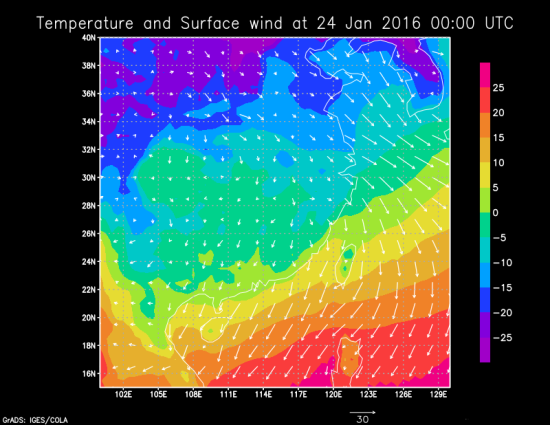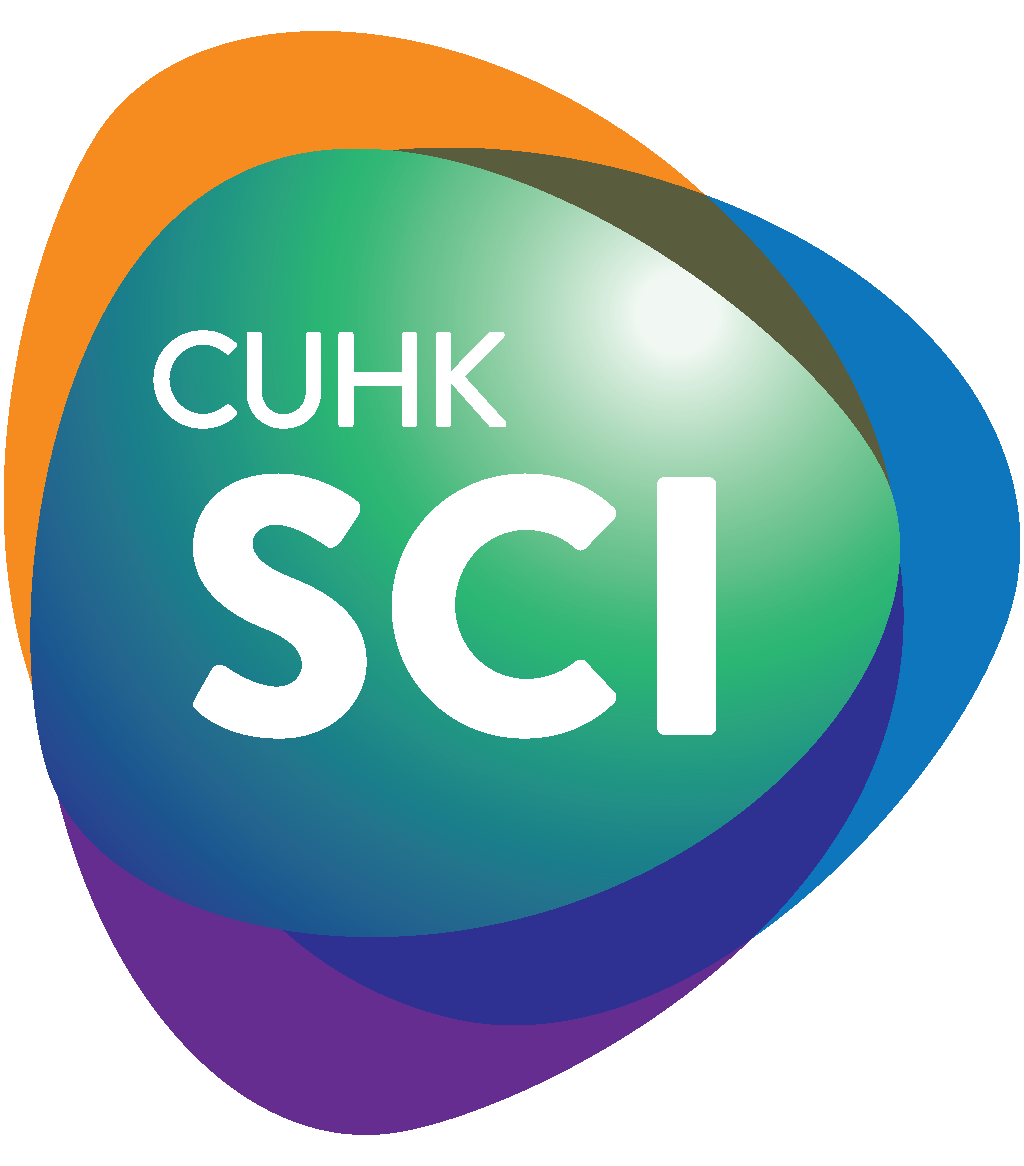There are many opportunities for EESC undergraduates to conduct research. We offer a summer research program, in which students will have opportunities to work in a research group, laboratory, or field to explore interesting and challenging questions related to global environmental change, atmospheric science, and geosciences.
Title: Effects of Various Agricultural Production Pathways on Global pm2.5 Concentration
2022/23 Summer
Student: SHEK Yan To, Stephen
Supervisor: Prof. TAI Pui Kuen Amos
During my research project, we investigated future global pm2.5 concentrations in 2050 under different agricultural scenarios outlined by the FAO. We used ammonia flux from agriculture as a precursor to nitrate pm2.5 formation in a chemical transport model. Surprisingly, transitioning from Business As Usual to either Stratified Society or Towards Sustainability did not significantly reduce global pm2.5 concentrations, with the alternative scenarios actually showing higher levels. Spatially, we observed similar patterns between the two alternative scenarios, with specific regions experiencing significant increases or decreases. This study highlighted the complexity of reducing pm2.5 and suggested that broader efforts beyond agriculture are needed. I gained valuable experience in numerical modeling, data analysis with Python, and working in a Linux environment. I am grateful for the support from my mentors and colleagues throughout this project. In the future, we plan to simulate other months to capture annual variations more comprehensively.
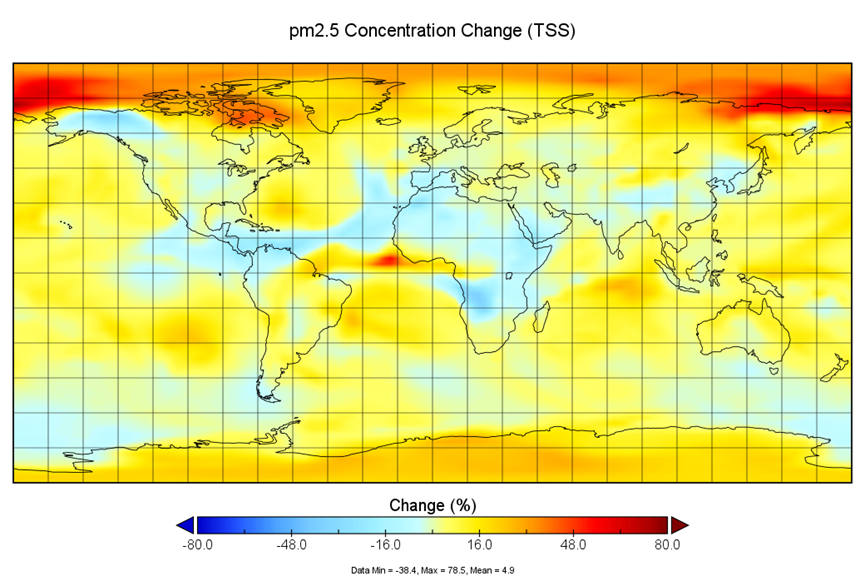
Title: Analysing the prediction skill of intraseasonal oscillation (ISO) by utilizing the Clustertech Platform for Atmospheric Simulation (CPAS)
2022/23 Summer
Student: WONG Man Nam, Natalie
Supervisor: Prof. TAM Chi Yung Francis
This project aimed to evaluate the prediction skill of ISO from late-May to mid-June in 2023 by utilizing CPAS. To accurately assess the strength of ISO, we employed the RMM index and BSISO indices to measure ISO activities within the study period. By comparing the predicted OLR and observation, we found that the model exhibited skillful prediction of eastward propagation of Madden-Julian Oscillation (MJO) with forecast lead time of 10 days. However, the prediction skill of MJO decreased for lead time exceeding 10 days.
This internship experience allowed me to actively participate in the research process. Working under the guidance of Prof. Tam, I have improved my analytical skills and enriched my knowledge about ISO and modelling. Furthermore, this project has aroused my interest in ISO, which became the topic of my final-year project.
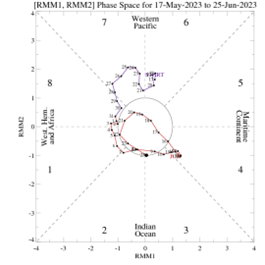
Title: Dynamical processes during tropical cyclone landfall
2021/22 Summer
Student: LAI Kei Yiu Bessie
Supervisor: Prof. TAM Chi Yung Francis
This research aims to conduct literature review on landfalling impacts of tropical cyclones under climate change. In this project, I read a lot of papers about the observed changes and future projections of the landfalling impacts of the tropical cyclones. Under climate change, the tropical cyclones generally have and will continue to have stronger landfall intensity, longer sustaining time, further traveling distance and larger dissipated wind power, in which these impacts are observed not only in Hong Kong, but also in China and other East Asian regions. I also learnt about different models in simulating the decay of tropical cyclones after landfall.
My experience and knowledge are limited as a junior undergraduate, but my supervisor, Prof. Francis Tam has guided me through the process and helped me a lot. Also, it is a valuable experience to join the meeting of Prof. Tam’s group to learn about the various research projects conducted by the postgraduate students. Knowing that tropical cyclones are more likely to bring more detrimental impacts to the affected regions in the future, this research experience makes me realize further investigation on intensification of tropical cyclones is vital as it may save many people or places at risk.
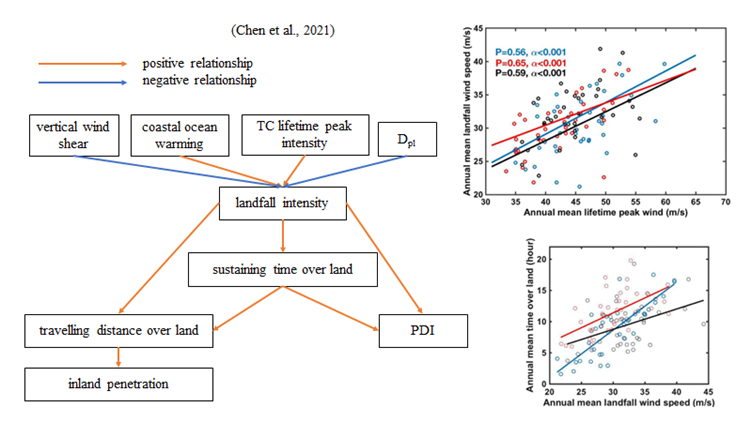
Title: Lake Basins Mapping from Remote Sensing Image Using Deep Learning
2021/22 Summer
Student: LEUNG Kai Kit
Supervisor: Prof. LIU Lin
Utqiagvik is a region with high density of lake basins, which is an important natural feature in geomorphology, planet exploration and monitoring climate change. Monitoring the lake basins one by one is difficult when there are thousands of lake basins in one region, in this case, deep learning can be used to map the lake basins. This study used DeepLabv3+ DCNN architecture to develop a neural network for mapping lake basin, with the dataset obtained through self-delineating, the result has recall rate of 0.516, precision rate of 0.427 and F1 score of 0.503. The mapping result varies over different region, size and type of lake basins, caused by the limitation of the dataset. This study has shown that deep learning is effective in mapping lake basin and future work can be done to improve the recognition process for better result.
This project allows me to have a taste of what doing research is like. The whole experience is like walking through a maze, sometimes the progress is smooth and sometimes it may go to a dead end due to a wrong approach. Luckily, we can always go backward and start again. Also, I learnt that doing research is a never-ending journey, when I thought that I have finished the project, I will find more problems that can be improved or other perspective that I can explore, like when I see a light in the maze but actually it is linking to another maze. Therefore, it is important to enjoy the process of doing research instead of expecting a perfect answer, or it will be difficult to do research in a long run.
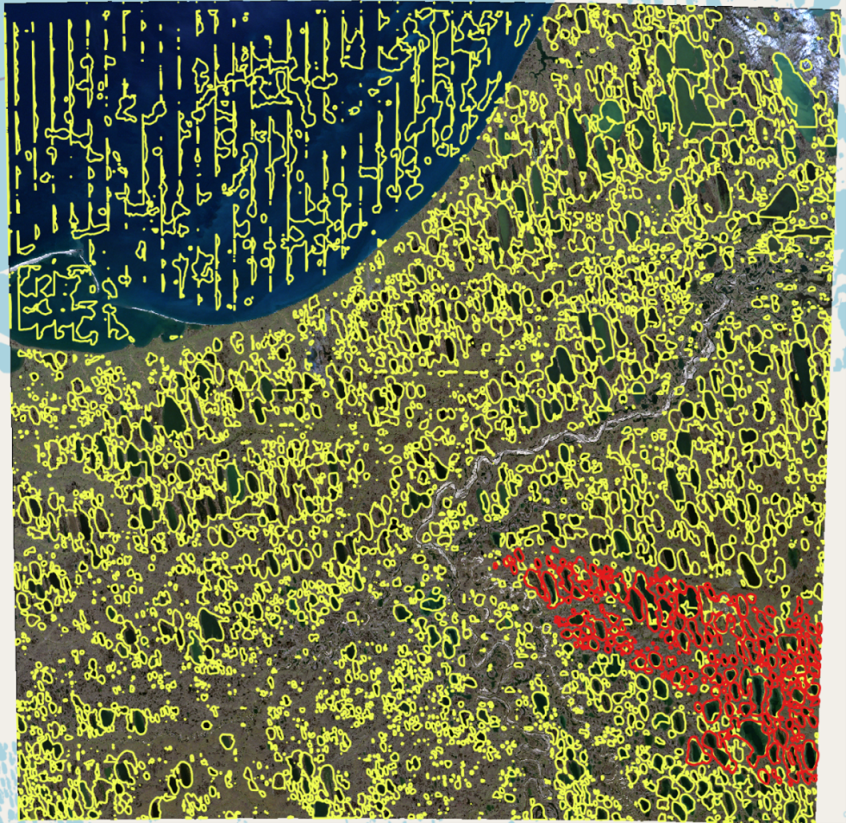
Title: Simulation of earthquake rupture propagation
2020/2021 Summer
Student: LAM Po Wang, Ryan
Supervisor: Prof. YANG Hongfeng
This project is definitely advanced and challenging for me, providing me with fruitful hands-on experience on rupture dynamic. During these three months, I learnt about the physical meanings of different parameters, analysed the effects of those parameters on the slip magnitude, understood the result from various physical laws, and examined how locations of the nucleation zone would affect the rupture pattern. This summer research programme not only allowed me to enhance my programming skills, but also offered me a chance to apply my knowledge on physics. Meanwhile, I had a precious opportunity to join the weekly meeting of Prof. Yang’s group, which let me comprehend diverse research topics presented by postgraduate students and postdocs. Therefore, I could find what I am interested.
As an undergraduate, though my knowledge is very limited, with the aid of Prof. Yang and my mentor, Bowie, I am able to build my own model to simulate different rupture scenarios based on the model of the 2015 Nepal earthquake. They had suggested several directions for me to work on throughout the research programme, and thus help eliminate my confusions. I wish I could continue to work with them and further investigate about the problems of earthquake rupture propagation.
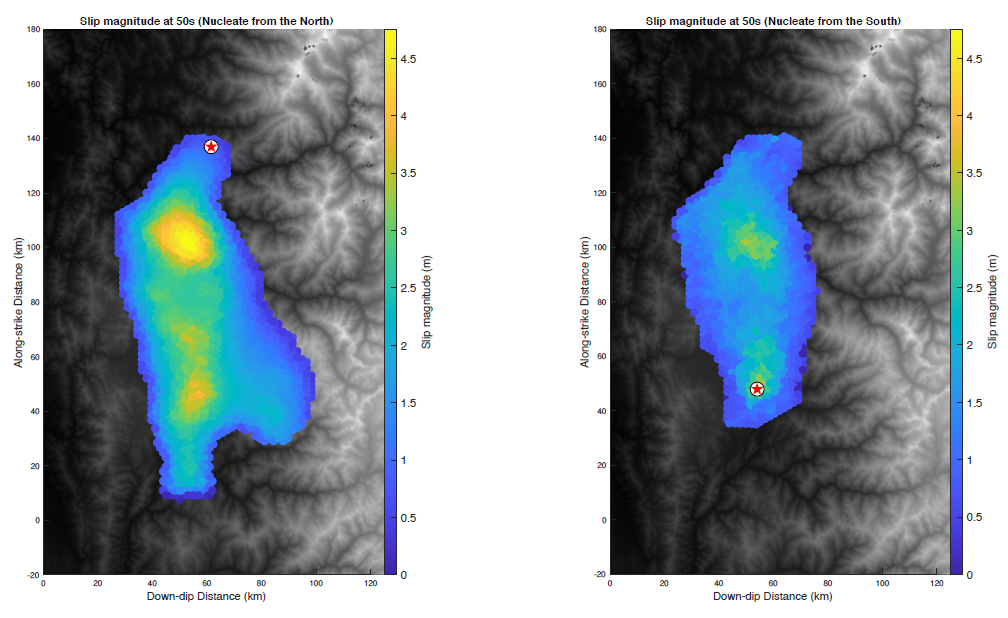
Title: Machine learning detection of long-period volcanic earthquakes
2020/2021 Summer
Student: NG Kai Yin
Supervisor: Prof. TAN Yen Joe
Not only does the research programme serve as an opportunity for exploring the area of machine learning that I had no experience in before, I can also work with the current researcher to know more about the field of research.
During the programme, my main task was to retrieve seismic data from the data centre to examine the performance of a machine learning model on long-period seismic events. When I was a bit lost at the beginning, my supervisor, Prof. Tan Yen Joe helped me a lot with some technical and programming problems. We had weekly meetings for me to explain my progress and discuss the difficulties encountered. Besides, he always encourages me to interpret the statistics of the results produced by the machine learning model.
Throughout the programme, the hands-on experience has enhanced my understanding of seismology and reasoning skills. Although the project has yet to be finished, further investigation of machine learning becomes a new idea for my future study.
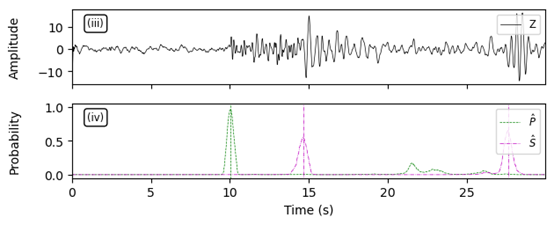
Title: Trends in global ammonia emission caused by Chinese food demands during 1987-2017
2019/2020 Summer
Student: TONG Ka Yan, Joy
Supervisor: Prof. TAI Pui Kuen Amos
In this research program, my major task was to extract and analyze multi-sourced data, and estimate the trends in ammonia (NH3) emission worldwide that have been driven by the ever-increasing food consumption demands in China, with a focus on the increase in Chinese meat consumption. The project has greatly strengthened my statistical and programming skills, and also provide a valuable opportunity for me to apply my knowledge learned in different courses to address practical real-world problems.
My supervisor, Professor Amos Tai, gave me lots of help and inspiration for me to conduct the research project. Although we could not meet-up face to face to discuss the project due to the epidemic, he still gave me a lot of advices and explained it patiently via emails or Zoom meeting, so that I could overcome different technical problems smoothly and successfully.
Throughout this research project, I got to know more about the relationship between climate change and human activities, which represents a great experience for me to prepare for my future study and work in relative fields.
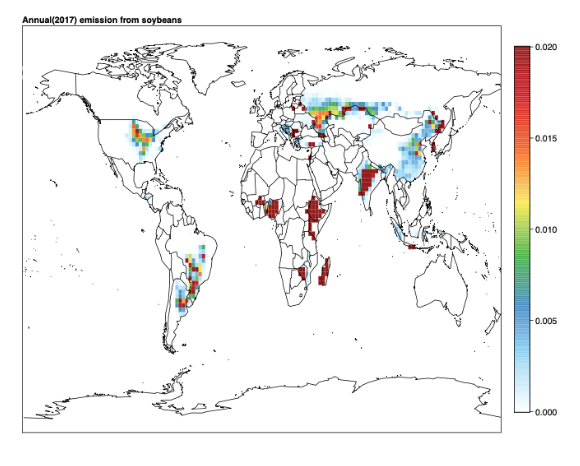
Title: The Effects of Ozone Concentration and Relative Humidity on the Ozonolysis of Polyunsaturated Fatty Acids
2016/2017 Summer
Student: Fandy CHENG
Supervisor: Prof. CHAN Man Nin
Droplets inside the flow cell reactor are being scanned by the Micro-Raman instrument.
Working at Prof. Chan’s laboratory this summer is definitely new and interesting to me, especially when the laboratory is just back in operation and lots of preparations need to be done for future experiments. I feel lucky that I can engage in designing a new experiment setup with other students, which could be an essential setup to study the heterogeneous oxidation of aerosol particles inside the Potential Aerosol Mass (PAM) flow reactor in future experiments. In addition, keeping the instruments well-maintained and calibrated enables me to learn more about the detailed structure and principle of the instruments.
Furthermore, I am pleased to have the chance to work with a PhD student in the laboratory at CityU on the project of studying the ozone and RH effect on the heterogeneous oxidation of unsaturated fatty acids using Micro-Raman instrument. Unexpected difficulties often emerged in running experiments and doing data analysis, but the way to solve these obstacles would be a great experience for my future work in any other fields.
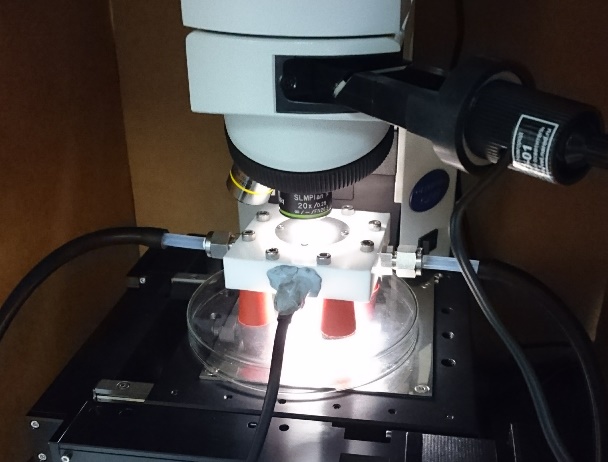
Droplets inside the flow cell reactor are being scanned by the Micro-Raman instrument.
2016 Summer
Students: Louis CHAN, Gabriel FAN and Mannie KAM
Supervisor: Prof. LIU Lin
Having a chance to work as a team to practically utilize the Phantom Unmanned Aerial Vehicle (UAV) on 3D modelling by structure from motion technique is a precious experience in our undergraduate study. We all had time to take the control of the plane and fly it over and around designed targets, taking photos with appropriate angles, distance intervals and route. Then, the Pix4D drone mapping software can help us generate a high resolution computer model. After consecutive trials, we have produced a manual on detail procedures on creating a model with high quality. This UAV will be used for outbound geological field excursions to simulate larger scale geologic structures.

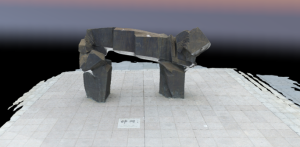
Title: Analyzing Meteorological Data for Extreme Weather Events in Hong Kong
2015/2016
Student: Perry MA
Supervisor: Prof. TAM Chi Yung Francis
The project provides opportunities to apply knowledge learnt in several atmospheric science courses. The major task is to extract and analyse meteorological data in order to understand the initiation of the cold surge and possible reasons for extreme cold weather in Hong Kong early this year. It was a bit challenging but I felt so excited when I could handle it myself.
Professor Francis Tam, my supervisor, has helped me a lot throughout the project. We have regular meetings few times a month to discuss the progress of the project. He has provided me several advices for my reasoning when interpreting the data. The project is still on going. The effect of the El Niño will be further investigated. The project is a brilliant experience for me to explore more in academic. I wish that interesting and useful results can be obtained after the project is done.
